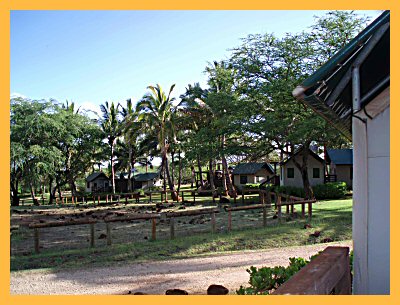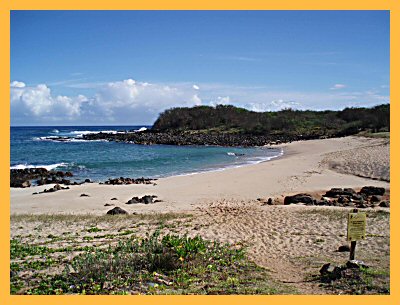 |
|||
 |
|||
 |
|||
 |
|||
 |
|||
 |
|||

by Gail Randall
![]() porting miles of
unoccupied white sand beaches, scattered low-rise hotels and a frontier like
village, Molokai, one of Hawaii’s least known and developed islands,
is Hawaii at its most natural. My friend is planning to do some diving here,
so I tag along to find out what this gorgeous island is all about. And it
is gorgeous.
porting miles of
unoccupied white sand beaches, scattered low-rise hotels and a frontier like
village, Molokai, one of Hawaii’s least known and developed islands,
is Hawaii at its most natural. My friend is planning to do some diving here,
so I tag along to find out what this gorgeous island is all about. And it
is gorgeous.
Picking up a rental car at Molokai Airport, we drive west on the island to
Maunaloa and the Beach Village at the Molokai Ranch, where we settle into
one of the village tentalows. The tentalows are solar-powered, rustic two-tent
configurations with decking and open-air bathrooms — roughing it, sort
of. A gentle stroll down hill from the tentalows are a beach village clubhouse
and open-air restaurant and, of course, some spectacular unspoiled beaches.
Up hill from the village, and passing through the ranch’s 65,000 acres
of cattle and horse country, is the Molokai Ranch Lodge, which houses the
resort’s more luxurious accommodations. The beach village, we surmise,
would suit our needs just fine, and we are correct. This is a place to kick
back, surf or boogie board at Kaupoa Beach, read a paperback, or simply veg
out.
A
gentle stroll down hill from the tentalows are … some spectacular unspoiled
beaches.
Our first day at the ranch we look over the lodge’s amenities—
an attractive lounge, restaurant, fitness center and infinity pool. After
we share sandwiches and salads at the Pianolo Lounge, we head for the beach.
Day two we become more adventuresome, driving to the town of Kaunakakai for
provisions and Dave’s famous ice cream cones, then heading up to the
Kalaupapa overlook for one of the island’s finest panoramic views. We
stop at the mule barns on Highway 470 to sign up for the five-mile ride down
Kalaupapa Trail to the Makanalua Peninsula and Kalaupapa, the island’s
leper colony, which is purportedly safe to visit due to the effectiveness
of sulfur drugs introduced in the 1940s.
The next morning we arrive at the mule barns where our group of 10 gathers
for some mule-riding instructions and the assignment of mules, according to
presumed fitness and age. The island’s most memorable excursion, the
ride snakes down a 1,786 foot decline with 26 switchbacks through verdant
terrain. My docile mule, Kumu, and I get along just fine, but my friend isn’t
as lucky, getting a frisky animal who tends to snack and gallop.
At trail’s base we leave our mules and board a bus for a fascinating
National Park Service tour of the leper colony. We view men’s and women’s
dormitories, a church, school, and visitor center, and stop at an ice cream
shop and bookstore. I buy the novel Moloka’i, the heartbreaking story
of a young Hawaiian girl who is sent for the duration of her life to Kalaupapa.
The tour takes us to Kawalao, the original settlement, where we visit St.
Philomena’s, Father Damien’s church, and then picnic at a park with
spectacular scenery of the north coast and watch a cute mongoose scampering
about. We are happy to note that the return trip up Kalaupapa Trail is a little
less arduous than the ride down. Kalaupapa National Park can also be reached
by air and on foot.
Besides scuba diving, tide pooling, snorkeling and horseback riding, there
are other excursions on the island, but after the mule ride I’m happy
to simply just stay put for awhile.
Molokai Ranch: www.molokairanch.com.
Molokai Mule Ride: 808-567-6088.
Gale
Randall is a Palo Alto, California based travel writer.
Return to: Recent articles, Top, Home.

Tentalows
Gale Randall photo
 Kaupoa
Beach
Kaupoa
Beach
Gale Randall photo